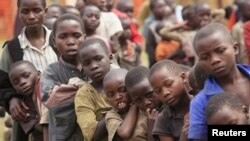NAIROBI —
Humanitarian aid group Doctors Without Borders (MSF - Médecins Sans Frontières) is scaling up operations in Uganda, where a new influx of refugees has arrived after renewed fighting between rebel group M23 and Democratic Republic of Congo forces.
According to MSF, 22,000 people have fled their homes in Congo's North Kivu province since July 11, when hostilities between the military and M23 rebels reignited.
The United Nations High Commissioner for Refugees (UNHCR) puts the number higher, at about 50,000.
MSF’s head of mission in Uganda, Ruben Pottier, says refugees entering the country for both safety and humanitarian aid have increased in the past week, following a lull.
Ugandan government authorities, he adds, are advising the refugees to move away from the border for their safety.
"Since the last weeks we have seen the increase of refugees and we speak of peak of 400 to 500 refugees per day," he said. "Of course that is not every day, but there are peaks of those numbers."
Last week's flare up in violence marked the first major conflict since Congolese forces bombed M23 headquarters in July.
Both sides blame each other for unrest around Goma, a city of about one-million people on the Congo-Rwandan border.
MSF says the new refugee arrivals are living in Uganda's Bukukwanga transit camp, a facility designed to hold about 12,000 people, but which UNHCR officials say is hosting more than 20,000.
The refugee agency has transferred between 4,000 and 5,000 refugees from the transit camp to a more permanent camp in Kyangwali, 150 kilometers away, where Pottier says there is need to scale up assistance.
“Health facilities, they are 14 in number now," he said. "Within one or two months that population is going to increase with an additional 25,000 refugees, so it means that health facilities and other facilities schools, water facilities, food and shelter — well it is not sufficient. All those facilities will have to scale up in a period let’s say one to two months."
DRC government and U.N. officials have tried for years to subdue the many militia and rebel groups that operate in North Kivu, without real success. M23 captured the provincial capital, Goma, for a brief time last year before retreating.
More fighting was reported Wednesday, raising the prospect that more Congolese civilians will soon be spilling across borders into neighboring countries.
According to MSF, 22,000 people have fled their homes in Congo's North Kivu province since July 11, when hostilities between the military and M23 rebels reignited.
The United Nations High Commissioner for Refugees (UNHCR) puts the number higher, at about 50,000.
MSF’s head of mission in Uganda, Ruben Pottier, says refugees entering the country for both safety and humanitarian aid have increased in the past week, following a lull.
Ugandan government authorities, he adds, are advising the refugees to move away from the border for their safety.
"Since the last weeks we have seen the increase of refugees and we speak of peak of 400 to 500 refugees per day," he said. "Of course that is not every day, but there are peaks of those numbers."
Last week's flare up in violence marked the first major conflict since Congolese forces bombed M23 headquarters in July.
Both sides blame each other for unrest around Goma, a city of about one-million people on the Congo-Rwandan border.
MSF says the new refugee arrivals are living in Uganda's Bukukwanga transit camp, a facility designed to hold about 12,000 people, but which UNHCR officials say is hosting more than 20,000.
The refugee agency has transferred between 4,000 and 5,000 refugees from the transit camp to a more permanent camp in Kyangwali, 150 kilometers away, where Pottier says there is need to scale up assistance.
“Health facilities, they are 14 in number now," he said. "Within one or two months that population is going to increase with an additional 25,000 refugees, so it means that health facilities and other facilities schools, water facilities, food and shelter — well it is not sufficient. All those facilities will have to scale up in a period let’s say one to two months."
DRC government and U.N. officials have tried for years to subdue the many militia and rebel groups that operate in North Kivu, without real success. M23 captured the provincial capital, Goma, for a brief time last year before retreating.
More fighting was reported Wednesday, raising the prospect that more Congolese civilians will soon be spilling across borders into neighboring countries.









